

U.S. Sailors refiled their radiation exposure lawsuit against Fukushima - National Top News. In 2011, thousands of U.S. sailors were ordered to assist with disaster recovery and rescue after the Fukushima disaster.
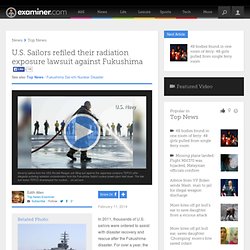
For over a year, the Fukushima nuclear power plant owner, Tokyo Electric Power (Tepco) joined the Japanese government in misleading the world. The sailors and many more were exposed to much higher levels of radiation than was reported. According to a Feb. 11 Common Dreams article, 70 sailors have filed a new $1 billion lawsuit against Tepco. This is after being deprived of help by the U.S. Navy. Fukushima Meltdowns: Global Denial At Work. By William Boardman -- Reader Supported News Does anyone in authority anywhere tell the truth about Fukushima?
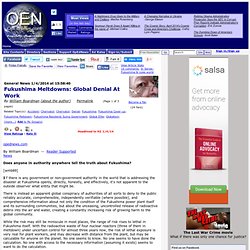
[wmb89] I f there is any government or non-government authority in the world that is addressing the disaster at Fukushima openly, directly, honestly, and effectively, it's not apparent to the outside observer what entity that might be. USS Ronald Reagan Crew Members Sick With Cancer Three Years After Fukushima Contamination [PHOTOS] “I was standing on the flight deck, and we felt this warm gust of air, and, suddenly, it was snowing,” sailor Lindsay Cooper told the New York Post in an interview published Monday.
![USS Ronald Reagan Crew Members Sick With Cancer Three Years After Fukushima Contamination [PHOTOS]](http://cdn.pearltrees.com/s/pic/th/fukushima-contamination-73130844)
Ongoing trouble at Fukushima plant. A trouble-prone system used to decontaminate radioactive water at Japan’s crippled Fukushima Dai-ichi nuclear power plant was switched off yesterday because of a chemical leak, the plant’s operator said.
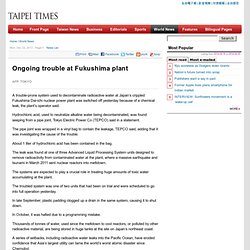
Hydrochloric acid, used to neutralize alkaline water being decontaminated, was found seeping from a pipe joint, Tokyo Electric Power Co (TEPCO) said in a statement. The pipe joint was wrapped in a vinyl bag to contain the leakage, TEPCO said, adding that it was investigating the cause of the trouble. About 1 liter of hydrochloric acid has been contained in the bag. The leak was found at one of three Advanced Liquid Processing System units designed to remove radioactivity from contaminated water at the plant, where a massive earthquake and tsunami in March 2011 sent nuclear reactors into meltdown.
The systems are expected to play a crucial role in treating huge amounts of toxic water accumulating at the plant. In October, it was halted due to a programming mistake. Home : CMER. Indigenous Elders and Medicine Peoples Council Statement on Fukushima. Reactor Leak Not Enough To Prevent Tokyo Winning Olympic Bid - iSports Times. How Japan's ice barrier will seal off Fukushima's nuclear ruins - NBCNews. Japan’s government gave the go-ahead on Tuesday to spend hundreds of millions of dollars to create a underground barrier of frozen earth around the stricken Fukushima nuclear plant.
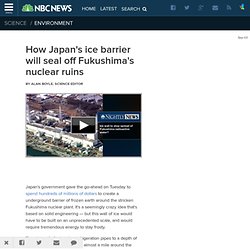
It's a seemingly crazy idea that's based on solid engineering — but this wall of ice would have to be built on an unprecedented scale, and would require tremendous energy to stay frosty. The plan calls for burying refrigeration pipes to a depth of 100 feet, every yard or so, for almost a mile around the radioactive site. Those pipes would freeze the ground to keep water from flowing in or out — and any new water that comes in contact with it would freeze as well, making the wall even stronger.
The job is scheduled to take 18 months, but once the barrier is fully in place, 10 feet of ice would seal off Fukushima's contaminated soil. Ice-barrier technology has been used at conventional construction sites for decades. TEPCO to start pumping out contaminated groundwater. Radioactive water leaking into Pacific, Fukushima watchdog declares “emergency” Nuclear Power: Fading Away or Powering Up? Richard K.
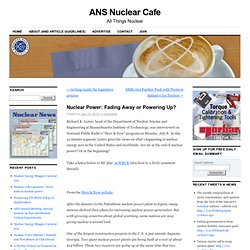
Lester, head of the Department of Nuclear Science and Engineering at Massachusetts Institute of Technology, was interviewed on National Public Radio’s “Here & Now” program on Monday, July 8. Tens of thousands protest against nuclear power in Tokyo. Record Radiation Found in Fukushima Fish. The port of the Fukushima No. 1 nuclear power plant where the highly radioactive fish was caught.
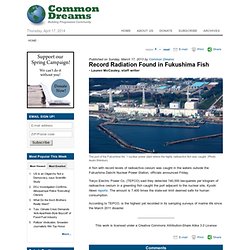
(Photo: Asahi Shimbun)A fish with record levels of radioactive cesium was caught in the waters outside the Fukushima Daiichi Nuclear Power Station, officials announced Friday. Tokyo Electric Power Co. (TEPCO) said they detected 740,000 becquerels per kilogram of radioactive cesium in a greenling fish caught the port adjacent to the nuclear site, Kyodo News reports. TEPCO admits it deserves blame for Fukushima nuclear meltdown. Fukushima Facts. Fukushima health-survey chief to quit post. Geoff Brumfiel Radiation health expert Shunichi Yamashita in his office at Fukushima Medical University in November 2012.
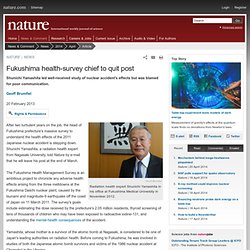
- NIRS. NIRS 35th ANNIVERSARY ACTION PLAN: A THREE-YEAR CAPACITY-BUILDING PROGRAM FOR THE NEW GENERATION OF ACTIVISTS CREATING THE NUCLEAR-FREE, CARBON-FREE FUTURE DISCUSSION 2013 marks NIRS’ 35th anniversary.

For more than three decades, NIRS has been both the core and catalyst for the grassroots movement for a safe, clean, affordable energy future. Over the next half-decade, the United States will establish a new policy for radioactive waste disposal, which will affect nearly every American. Tepco finds 920 millisieverts per hour in Fukushima Unit 1 torus room — Gundersen: “There are fuel fragments outside the containment” Fukushima Daiichi Nuclear Plant Weekly Review. Tepco, Security Sacrificed on the Altar of Profit. Translated and review by Henry Crapo, on Wednesday 16 March 2011.
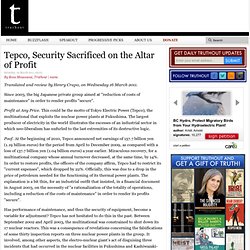
Since 2003, the big Japanese private group aimed at "reduction of costs of maintenance" in order to render profits "secure". Profit at Any Price. This could be the motto of Tokyo Electric Power (Tepco), the multinational that exploits the nuclear power plants at Fukushima. The largest producer of electricity in the world illustrates the excesses of an industrial sector in which neo-liberalism has unfurled to the last extremities of its destructive logic.
Poof. Has performance of maintenance, and thus the security of equipment, become a variable for adjustment? This scandal implicating Tepco is not an isolated one. But who cares about security, when the race for profits takes command? Japan Atomic Said to Seek Rollover of 104 Billion Yen Loans. Japan Atomic Power Co., a wholesale nuclear power generator owned by regional utilities, is in talks with banks to roll over 104 billion yen ($1.1 billion) loans due in April, two people familiar with the matter said.